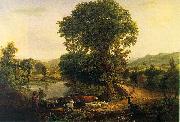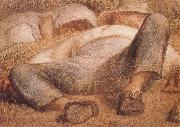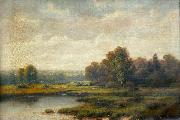Wholesale Oil Painting No Minimum |
|||||||||||
|
|
|||||||||||

|
|||||||||||
|
|
|
||||||||
George Inness1825-1894 George Inness Galleries George Inness (May 1, 1825 -August 3, 1894), was an American landscape painter; born in Newburgh, New York; died at Bridge of Allan in Scotland. His work was influenced, in turn, by that of the old masters, the Hudson River school, the Barbizon school, and, finally, by the theology of Emanuel Swedenborg, whose spiritualism found vivid expression in the work of Inness' maturity. He is best known for these mature works that helped define the Tonalist movement. Inness was the fifth of thirteen children born to John Williams Inness, a farmer, and his wife, Clarissa Baldwin. His family moved to Newark, New Jersey when he was about five years of age. In 1839 he studied for several months with an itinerant painter, John Jesse Barker. In his teens, Inness worked as a map engraver in New York City. During this time he attracted the attention of French landscape painter Regis François Gignoux, with whom he subsequently studied. Throughout the mid-1840s he also attended classes at the National Academy of Design, and studied the work of Hudson River School artists Thomas Cole and Asher Durand; "If", Inness later recalled thinking, "these two can be combined, I will try." Concurrent with these studies Inness opened his first studio in New York. In 1849 Inness married Delia Miller, who died a few months later. The next year he married Elizabeth Abigail Hart, with whom he would have six children. |
||||||||
|
|
||||||||
Afternoon
Afternoon Painting ID:: 4208 |
1846 1846 |
|||||||
|
|
||||||||
Jean Francois Millet1814-1875 French Jean Francois Millet Galleries Millet was the first child of Jean-Louis-Nicolas and Aim??e-Henriette-Adelaide Henry Millet, members of the peasant community in the village of Gruchy, in Gr??ville-Hague (Normandy). Under the guidance of two village priests, Millet acquired a knowledge of Latin and modern authors, before being sent to Cherbourg in 1833 to study with a portrait painter named Paul Dumouchel. By 1835 he was studying full-time with Lucien-Th??ophile Langlois, a pupil of Baron Gros, in Cherbourg. A stipend provided by Langlois and others enabled Millet to move to Paris in 1837, where he studied at the Ecole des Beaux-Arts with Paul Delaroche. In 1839 his scholarship was terminated, and his first submission to the Salon was rejected. After his first painting, a portrait, was accepted at the Salon of 1840, Millet returned to Cherbourg to begin a career as a portrait painter. However, the following year he married Pauline-Virginie Ono, and they moved to Paris. After rejections at the Salon of 1843 and Pauline's death by consumption, Millet returned again to Cherbourg. In 1845 Millet moved to Le Havre with Catherine Lemaire, whom he would marry in a civil ceremony in 1853; they would have nine children, and remain together for the rest of Millet's life. In Le Havre he painted portraits and small genre pieces for several months, before moving back to Paris. It was in Paris in the middle 1840s that Millet befriended Constant Troyon, Narcisse Diaz, Charles Jacque, and Theodore Rousseau, artists who, like Millet, would become associated with the Barbizon school; Honor?? Daumier, whose figure draftsmanship would influence Millet's subsequent rendering of peasant subjects; and Alfred Sensier, a government bureaucrat who would become a lifelong supporter and eventually the artist's biographer. In 1847 his first Salon success came with the exhibition of a painting Oedipus Taken down from the Tree, and in 1848 his Winnower was bought by the government. |
||||||||
|
|
||||||||
|
|
Afternoon
Afternoon Painting ID:: 55856 |
mk245
1865
72x97cm
mk245 1865 72x97cm |
||||||
|
|
||||||||
George Spencerpainted Hazy Afternoon in 19th Century |
||||||||
|
|
||||||||
|
|
Afternoon
Afternoon Painting ID:: 85600 |
19th Century
Medium Oil on canvas
Dimensions 18 x 27 inches
cyf 19th Century Medium Oil on canvas Dimensions 18 x 27 inches cyf |
||||||
|
|
||||||||
|
George Spencer painted Hazy Afternoon in 19th Century Afternoon 19th Century Medium Oil on canvas Dimensions 18 x 27 inches cyf |
||||||||
|
|
||||||||
|
Prev Next
|
||||||||
|
|
||||||||
|
Related Paintings to George Spencer :. |
||||||||
|
|
||||||||
|
CONTACT US |



